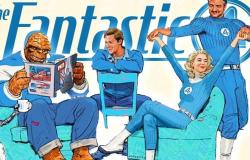Cesare Pavesewho despite being from the Langhe of Calabria knew for having been confined to Brancaleone, he taught us that we need a country. For that pleasure of leaving, because the town, which is not the artificial village, never makes you feel alone: because in the plants, in the people, and even when you’re not there, that ideal place of yours always awaits you.
The Calabrian writer has been linked to his country since the times of Corrado Alvaro. And even contemporary literature that has become national continues on this bend: Criaco with Africo, Dara with Girifalco, Gangemi with S. Cristina d’Aspromonte, Abate with Carfizzi. It does not escape the paradigm Santo Gioffrè returned to the bookstore with five pearls of stories gathered in the collection “Evasioni d’amore” published by the antagonist publishing house “Castelvecchi”. It is no coincidence that an author who has been in the Mondadori catalog for his “Artemisia Sanchez” (translated into a successful TV series for Rai) has landed on that side of the wrong. Gioffrè is not only a writer, but a highly capable militant doctor, he has addressed the misdeeds of the Calabrian public health system in courtrooms and in investigative books, a former public administrator, motivator of his community, he has recalled forgotten aspects of its history with reconstruction in costume which has long been a historicized event, a militant of the seventies thinking of leading the assault on the revolutionary sky.
His town is Seminara. Land of ceramics, of landowners, of barbaric feuds, of honored society and of the humiliated and offended. And Gioffrè’s love escapes return to the land, to the countryside, to the farmers, a sort of common denominator of Calabrian literature of our time which, in addition to always having a country, also has a world of reference. Like many of his generation, Gioffrè read a lot of Hemingway (the “feeling new” glosses Guccini) and his influence can be seen in his essential writing, the short sentences; however, betraying the famous Ernest in the position of the narrator, who in these 5 stories is almost always on the scene highlighting Santo Gioffrè’s hypertrophic ego with the result of increasing pathos and reading pleasure.
He honors his father and mother, Gioffrè, in his stories, as he did with his biography when he graduated in Messina he was preparing to go around the world and instead remained in Seminara in his wild land. Born in the time of cicadas, when “the intermittent dance of fireflies illuminated every heart in search of peace”, while today, as Pasolini had promptly observed, “there are no longer fireflies among the dark streets”. But it is not Arcadia because the author declines his attachment to Barlaam the heretic, Leonzio Pilate, Tommaso Campanella, Bernardino Telesio who opposed “the massacres brought by peoples who came from far away”. The conquerors and the oppressed in the human stories of poor people.
There is also Lucio Dalla in one of the stories, who was Santo’s friend and associate, thanks to his literature, which is placed in the scene between an uncle who teaches his student nephew how not to get lost in the woods by recognizing “the four stars of the Big Dipper” in a very poor society that had the means to avoid experiencing the sadness of loneliness.
They are stories of our families, of unrecognized spurious children and in the magnificent plot the narrator doctor in Buenos Aires for a conference meets a familiar figure from his town who remembers among the few things the nickname of his strain “a ‘ngiuria”, and writer comments in an introspective voice “because it is the places in which we live and not the truths that give legitimacy to the history of men”.
In addition to emigration, surrounding love affairs, there is no shortage of earthquakes, malaria, wounds and ailments described with the technicality of the doctor. And the ‘ndrangheta is not missing either. Gioffrè goes to the roots by showing us his ability to plot intrigues and build territorial federalisms. The writer narrates with authenticity and getting his hands dirty with other removed aspects. The story “The theft of the Sacred Vacche” has an epic Western film style similar to John Ford which would deserve a contemporary adaptation to be shot in Calabria. There is not only narrative intensity between the pages but also historical and content recall. With Fausto Gullo and the company boss who find themselves confined by fascism in Ponza and get to know each other and then meet again after the war. It was the time when the self-defense of the poor mixed ideology and needs, once removed from the commonplace and which was a discrimination in some areas that went differently compared to those who were the chosen guard of landowners and landowners. Thick plots where the author also knows how to insert the German medical officer who knows the myths and history of that place such as that of Leonzio Pilate who had translated the Iliad and the Odyssey and who instead of bringing the Nazi war saves a boy from malaria receiving gratitude from massaru Carmine for him and his soldiers delicious figs and fresh ricotta.
Santo Gioffrè throughout his life studied and found documents on the feudal lords of Seminara. He created a plot to restore here the love between Anna Maria Spinelli and the musician Giovan Battista Pergolesi, an intense story of prison passion in Naples which between Stabat Mater and re-enactment of massacres of poor Waldensians captivates with delight. How entertaining is the judicial account of a crime that scrutinizes in depth the folds of society “which was master, even, of the moral misery” of men and women. And that all this is not just a legacy of what we were, unfortunately we see it again in the news of these days with a grandmother who strangles the unborn grandson of her thirteen-year-old daughter in Villa San Giovanni, in the robbers who lure a homosexual to Reggio Calabria on the web to plunder him , in the six boys who brutally beat a homeless man in the Vibo area, filming him with their cell phone. At the time of the missing fireflies. Santo Gioffrè’s love escapes make us reflect on what we were and what we have become.
***
Maysoon Majidi and Marjan Jamali are two Iranian women who are political refugees and confined in two Calabrian prisons, arrested because they were considered “smugglers”. Thanks to the guarantor of the prisoners, Luca Muglia, and the network of Calabrian activists, this very harmful affair has emerged and shows all the contradictions of decrees that do not look at the person.
The woman, who was granted house arrest at the request of her lawyer Giancarlo Liberati, has finally hugged her eight-year-old son again temporarily entrusted to the care of an Afghan family in the community while the mother has been detained at the prison in Reggio Calabria since October. The woman was raped by smugglers who then accused her of being the commander of the boat of hope. Maysoon Majidi, a 27-year-old Iranian director and activist, has been in prison in Castrovillari for five months on charges of aiding illegal immigration and has started a hunger strike. He lost 14 kilos.
Those who accused her of being a smuggler have recanted on TV, as her lawyer is trying to prove. Sad to note that we have the worst Iran at home.
***
Pino Muto, founder of the Avis office in the small town of Lago, was awarded for his 50 years of donation and volunteering. Teacher and educator in national boarding schools, very involved in the third sector, Pino Muto began to spread the culture of giving in a peripheral area when hemophilia was present and afflicted those who entered into marriages between blood relatives. Half a century ago to donate blood you had to reach Cosenza. Now the Avis section of Lago, a municipality of 2000 souls thanks to the work of Pino Muto, has 150 donor members, and the governing council of the municipal Avis is two-thirds made up of young people. A fine example of active citizenship which offers the portrait of a supportive Calabria. ([email protected])
Corriere della Calabria is also on WhatsApp. Enough click here to subscribe to the channel and always be updated





